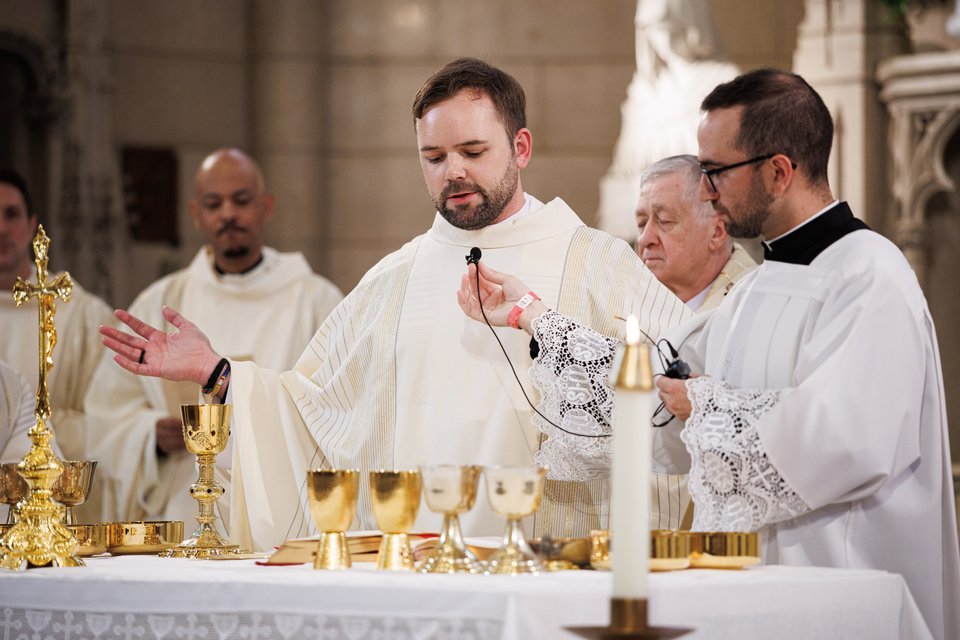 Chaldean Bishop Francis Kalabat holds up a crucifix during a prayer vigil in support of persecuted Iraqi Christians on Aug. 1 at Mother of God Church in Southfield. Bishop Kalabat, flanked by the Arabic symbol “noon,” which is being used by Islamist militants to identify victims, called on Christians to be forgiving, but not to cease in their cries for justice.
Chaldean Bishop Francis Kalabat holds up a crucifix during a prayer vigil in support of persecuted Iraqi Christians on Aug. 1 at Mother of God Church in Southfield. Bishop Kalabat, flanked by the Arabic symbol “noon,” which is being used by Islamist militants to identify victims, called on Christians to be forgiving, but not to cease in their cries for justice.Southfield — Standing in the sanctuary of Mother of God Chaldean Church, flanked by an empty cross and two ominous symbols, Chaldean Bishop Francis Kalabat led more than 1,000 people Aug. 1 in an earnest prayer for peace and a plea for help.
The bright red symbols were the Arabic letter ن, and they were ominous because of their meaning this month in Iraq, where Islamist militants have used it to identify some 200,000 Iraqis singled out for an ultimatum: Convert to Islam, pay a tax, or be killed.
The symbol (pronounced ‘noon’) stands for “Nassara” or “Nazarene” — Christian. Painted on the targets’ houses, it’s intended by the militants as a derogatory term. But Bishop Kalabat said he wears it with honor.
“This is the latest image today of what has been endured for us as the cross. This is our ن,” he said, pointing to the wooden crucifix behind him. “This is just a new manifestation. A new way of attacking us, a new way of persecuting us.”
 Supporters sell T-shirts with the Arabic letter ن — pronounced “noon” — to raise money for humanitarian aid for Iraqi refugees.
Supporters sell T-shirts with the Arabic letter ن — pronounced “noon” — to raise money for humanitarian aid for Iraqi refugees.Bishop Kalabat, who in June was ordained the second bishop of the Southfield-based Chaldean Eparchy of St. Thomas the Apostle, urged those in attendance to keep their focus on Jesus, and to unite their sufferings with him.
“That’s the suffering that we Christians have endured for 2,000 years, and will continue to endure until the end of time,” he said. “We Christians will be persecuted and crucified. Why? Because our beloved Jesus, the one we are anointed in, was crucified.”
The prayer vigil at Mother of God Church followed a rally and march earlier in the day in downtown Detroit, which was attended by about 150 mostly young Chaldean Christians. After the prayer vigil at the cathedral, Bishop Kalabat led a Eucharistic procession and rosary outside the church.
In a powerful address to the overflowing congregation, which included several local media outlets, Bishop Kalabat acknowledged the difficulty in forgiving those who unjustly persecute and kill Christians in the Middle East and elsewhere.
“I know I cannot forgive these people who keep hurting us,” he said. “But I know what Jesus said on the cross: ‘Father, forgive them, for they do not know what they have done.’ And I know that he can give me that grace, but we need to ask.”
But the bishop said forgiveness does not mean Christians should not also pray and ask for justice, including from elected leaders. He called on the United Nations and international community to condemn the violence as genocide and said humanitarian aid was badly needed for Iraqi refugees, many of whom have found temporary protection from the Kurdish army after fleeing their homes in northern and central Iraqi cities such as Mosul.
Bishop Kalabat had especially pointed words for President Barack Obama, whom he said has not done much to address the problem.
“I don’t understand President Obama’s words, ‘The situation is an Iraqi problem.’ Since when? How many thousands of American soldiers were sacrificed? Bloodied, lost limbs, lost their souls, lost their lives. How is this not an American problem?” Bishop Kalabat said.
He said the inaction by the White House has prompted the Chaldean community to pursue direct humanitarian aid instead, including via bills currently before Congress.
“This community, you have responded in the most beautiful way,” he said, referring to a $60,000 collection taken up by local Chaldean parishioners about a month ago. “It was a drop in the bucket (compared to what’s needed), but it did help.”
 Chaldean Bishop Francis Kalabat lead a Eucharistic procession and rosary Aug. 1 outside Mother of God Church in Southfield to pray for an end to violence against Christians in Iraq.
Chaldean Bishop Francis Kalabat lead a Eucharistic procession and rosary Aug. 1 outside Mother of God Church in Southfield to pray for an end to violence against Christians in Iraq.He thanked the government officials who traveled to Iraq to visit with refugees, especially from Michigan and San Diego, Calif., where the two largest concentrations of Chaldeans in the United States reside.
The bishop said advocacy groups were in the works, and a website will be created at www.HelpIraq.net to keep the community informed about ways to help, donate and get involved.
“We’re trying to bring the community together to be one voice. Not different organizations doing different things, but one voice, one community, one action,” he said.
Outside the cathedral, volunteers sold T-shirts with the ن symbol to raise money for the Mosul Relief Fund, an effort Bishop Kalabat praised. But while the symbol has turned into something of a social media awareness campaign, the bishop cautioned Christians against losing sight of what’s truly important.
“We put on the shirts. It’s cool. It’s very nice,” he said. “(But) mourn the cross, live the cross, be the cross. Taste the sweetness of Jesus’ love through the cross. That’s what we’re called to do.”
Bishop Kalabat referred to the 2008 martyrdom of Mosul Bishop Mar Paulos Faraj Rahho, calling him a “personal hero” for his constant message of forgiveness.
“Proclaiming Jesus’ love for us is why he died. So they opened his will, and the first thing they found printed was Paul’s letter to the Romans, chapter 14: ‘If we live, we live for the Lord. If we die, we die for the Lord. So that whether we live or whether we die, we belong to the Lord.’ We belong to Jesus,” Bishop Kalabat said to a standing ovation from the packed cathedral. “They can take our lives. They can’t take our souls. They can’t take our spirit. They can’t take eternal life.”










